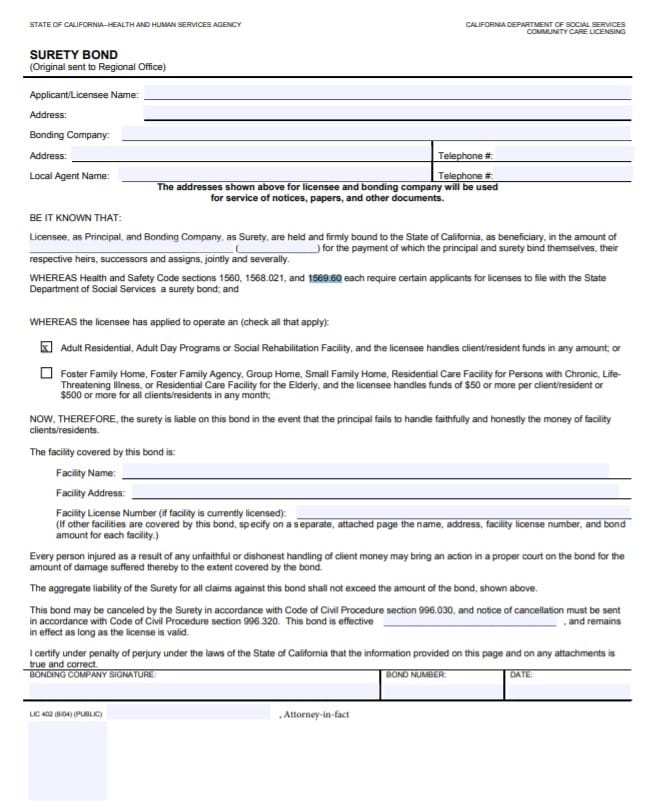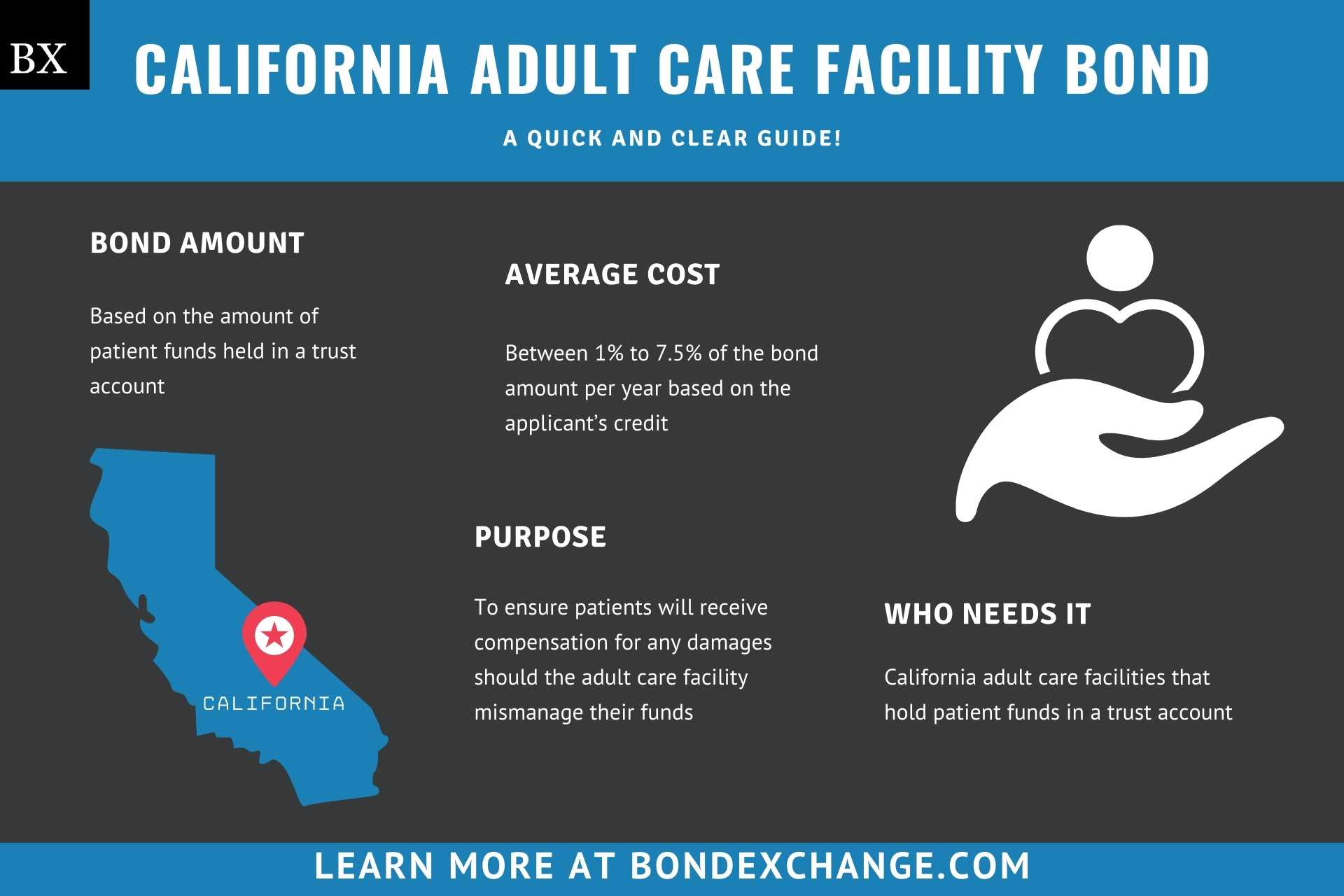California Adult Care Facility Bond: A Comprehensive Guide
This guide provides information for insurance agents to help their customers obtain a California Adult Care Facility Bond
At a Glance:
- Lowest Cost: 1% of the bond amount per year based on the applicant’s credit
- Bond Amount: Based on the amount of patient funds held in a trust account (more on this later)
- Who Needs it: California adult care facilities that hold patient funds in a trust account
- Purpose: To ensure patients will receive compensation for any damages should the adult care facility mismanage their funds
- Who Regulates Adult Care Facilities in California: The California Department of Health and Human Services

Background
California requires all adult care facilities operating in the state to obtain a license with the Department of Health and Human Services. The California legislature enacted the licensing laws and regulations to ensure that adult care facilities engage in ethical business practices. To provide financial security for the enforcement of the licensing law, adult care facilities that hold patient funds in a trust account must purchase and maintain a surety bond to be eligible for licensure. Additionally, federal statute 483.10 requires all long-term care facilities that hold patient funds in a trust account to purchase a surety bond or other similar form of security. However, the federal regulation leaves the implementation and enforcement of this requirement to individual states.
What is the Purpose of the California Adult Care Facility Bond?
California requires adult care facilities that hold patient funds in a trust account to purchase a surety bond as part of the application process to obtain a business license. The bond ensures that patients will receive compensation for financial harm if the adult care facility fails to comply with the regulations set forth in the applicable licensing statute (there are multiple statutes that govern these licenses). Specifically, the bond protects patients in the event the adult care facility in any way mismanages patient funds. In short, the bond is a type of insurance that protects the public if the adult care facility acts unethically with patient funds.
How Can an Insurance Agent Obtain a California Adult Care Facility Surety Bond?
BondExchange makes obtaining a California Adult Care Facility surety bond easy. Simply log in to your account and use our keyword search to find the “adult” bond in our database. Don’t have a login? Gain access now and let us help you satisfy your customers’ needs. Our friendly underwriting staff is available by phone at (800) 438-1162, email, or chat from 7:30 AM to 7:00 PM EST to assist you.
At BondExchange, our 40 years of experience, leading technology, and access to markets ensures that we have the knowledge and resources to provide your clients with fast and friendly service whether obtaining quotes or issuing bonds.
Not an agent? Then let us pair you with one!
Click the above image to find a BX Agent near you
How is the Bond Amount Determined?
California Health and Safety Code Sections 1560, 1568.021, and 1569.60 dictate that the limit on all Adult Care Facility bonds must be in an amount that reflects the total number of patient funds held in a trust account. Additionally, each statute specifies that the bond amount may not be less than $1,000.
Is a Credit Check Required for the California Adult Care Facility Bond?
Surety companies will run a credit check on the owners of the adult care facility to determine eligibility and pricing for the California Adult Care Facility Bond. Owners with excellent credit and work experience can expect to receive the best rates. Owners with poor credit may be declined by some surety companies or pay higher rates. The credit check is a “soft hit”, meaning that the credit check will not affect the owner’s credit.
How Much Does the California Adult Care Facility Bond Cost?
The California Adult Care Facility Bond can cost anywhere between 1% to 7.5% of the bond amount per year. Insurance companies determine the rate based on a number of factors including your customer’s credit score and experience. The chart below offers a quick reference for the bond cost on a $10,000 bond requirement.
$10,000 Adult Care Facility Bond Cost
| Credit Score | Bond Cost (1 year) | Bond Cost (1 month) |
|---|---|---|
| 800+ | $100 | $10 |
| 625 – 799 | $150 | $15 |
| 575 – 624 | $366 | $37 |
| 550 – 574 | $500 | $50 |
| 500 – 549 | $750 | $75 |
*The credit score ranges do not include other factors that may result in a change to the annual premium offered to your customers, including but not limited to, years of experience and underlying credit factors contained within the business owner’s credit report.
Who is Required to Purchase a Bond?
The California Department of Health and Human Services requires all adult residential, adult day programs, and adult rehabilitation facilities operating in the state to obtain a business license. To qualify for licensure, adult care facilities that hold patient funds in a trust account must purchase and maintain a surety bond in an amount reflecting the total amount of patient funds held, but not less than $1,000.

BondExchange now offers monthly pay-as-you-go subscriptions for surety bonds. Your customers are able to purchase their bonds on a monthly basis and cancel them anytime. Learn more here.
How Do Adult Care Facilities Apply For a License in California?
Adult care facilities in California must navigate several steps to secure their licenses. Below are the general guidelines, but applicants should refer to the application packet for details on the process.
License Period – All California Adult Care Facility Licenses expire annually and must be renewed before the expiration date
Step 1 – Complete Orientation
The Department of Health and Human Services requires all applicants for an Adult Care Facility License to complete an orientation and obtain a certificate of completion. Applicants can register for orientation here.
Step 2 – Purchase a Surety Bond
Applicants who hold patient funds in a trust account must purchase and maintain a surety bond, in an amount set by the Department of Health and Human Services, that reflects the total (estimated for first-time applicants) number of patient funds held.
Step 3 – Complete the Application
All California Adult Care Facility License applications should be mailed to the following address:
Department of Social Services
Centralized Applications Bureau
Community Care Licensing
Adult and Senior Care Program
744 P Street, MS 9-14-8201
Sacramento, CA 95814
Facilities must complete the application in its entirety, and submit the appropriate fees. Additionally, applicants must undergo a credit check and submit financial documents for review during the application process.
Step 4 – Meet with the Department
Once the application is submitted, applicants must meet one-on-one with a representative from the Department of Health and Human Services to review their application
Step 5 – Complete Training
After meeting with the Department, applicants must undergo training specific to their license’s classification. Applicants will have the opportunity to have any of their questions, regarding licensure, answered during the training.
Step 4 – Pass Inspection
Adult care facilities must have their physical location inspected by the Department of Health and Human Services to determine the facility is in compliance with all ordinances/regulations.
How Do California Adult Care Facilities Renew Their License?
Prior to the license expiration date, the Department of Health and Human Services will contact the adult care facility with instructions on how to renew their license. All California Adult Care Facility Licenses expire annually and must be renewed before the expiration date.
What are the Insurance Requirements for Adult Care Facilities in California?
The Department of Health and Human Services does not require adult care facilities to purchase any form of liability insurance as a prerequisite to obtaining a business license. Applicants who hold patient funds in a trust account must purchase and maintain a surety bond, in an amount set by the Department of Health and Human Services, that reflects the total ( estimated for first-time applicants) number of patient funds held.
How Do California Adult Care Facilities File Their Bond?
Adult care facilities should mail their completed bond form, including the power of attorney, to the following address:
Department of Social Services
Centralized Applications Bureau
Community Care Licensing
Adult and Senior Care Program
744 P Street, MS 9-14-8201
Sacramento, CA 95814
The surety bond requires signatures from both the surety company that issues the bond and from an owner/officer of the adult care facility. The surety company should include the following information on the bond form:
- Legal name and address of entity/individual(s) buying the bond
- Surety company’s name, address, and phone number
- Bond amount
- Date the bond goes into effect
- Date the bond is signed
What Can California Adult Care Facilities Do to Avoid Claims Against Their Bonds?
To avoid claims on their bond, adult care facilities in California must adhere to the following provisions:
- Hold all patient funds in a trust account
- Do not mismanage patient funds
- Accurately report on all patient funds
What Other Insurance Products Can Agents Offer Adult Care Facilities in California?
California does not require adult care facilities to purchase any form of liability insurance as a prerequisite to obtaining a business license. However, most reputable facilities will seek to obtain insurance coverage anyway. Bonds are our only business at BondExchange, so we do not issue any other types of insurance, but our agents often utilize brokers for this specific line of business. A list of brokers in this space can be found here.
How Can Insurance Agents Prospect for California Adult Care Facility Customers?
California conveniently provides a public database to search for licensed adult care facilities in the state. The database can be accessed here. Contact BondExchange for additional marketing resources. Agents can also leverage our print-mail relationships for discounted mailing services.

